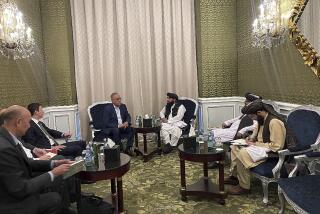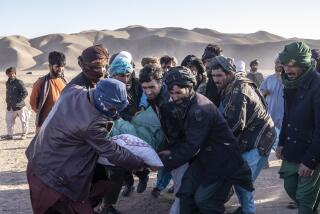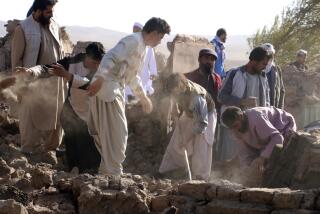As Assembly Meets, Region Remains Lawless
- Share via
KABUL, Afghanistan — As delegates to this country’s grand assembly, or loya jirga, spent Saturday brainstorming ways to solidify the peace that has taken hold in most areas, a new outbreak of lawlessness racked the north and threatened to shut down humanitarian relief work.
Long rebellious, the region around Mazar-i-Sharif has been the scene of violence in recent days as three rival commanders have been taking part in the gathering here--and presumably supervising incursions into their adversaries’ territory on the assumption that those rivals would let down their guard while attending the conference.
The incidents, including the gang rape of an international aid worker, testify to the residual animosity and aggression that could expose vast swaths of the country to conflict and bloodshed even as a new government with popular endorsement seeks reconciliation after more than two decades of war.
The clashes and attacks in the north prompted United Nations special envoy Lakhdar Brahimi to complain to President-elect Hamid Karzai that food and other assistance might not reach needy refugees in the region unless the attacks cease.
“U.N. staff are now reporting an alarming level of violence that is affecting both personal security and the confidence of local residents in the ability of aid workers to assist them,” U.N. spokesman Manoel de Almeida e Silva said, quoting a statement issued by Brahimi.
Brahimi also drew Karzai’s attention to attacks, robberies and beatings carried out against aid organizations, as well as harassment of refugees and a gun battle in the village of Sholgara that shot up a medical clinic.
On Friday, an American aid vehicle en route to oversee bread distribution at a refugee camp in Dehdadhi, near Mazar, was fired on, prompting the agency to pull out of the country, Almeida said.
Other nongovernmental organizations “are considering similar actions because of the situation in that part of the country,” he said.
U.N. officials had been informed of the gang rape only two days before because the victim’s employer, which was not identified for her protection, wanted to relocate her to a safe place first, Almeida said.
Brahimi’s statement said he “regretted that U.N. intervention with local authorities did not result in effective measures” being taken to put an end to the violence. The U.N. envoy has therefore turned to Karzai, who has been urging regional warlords to submit to central authority so Afghanistan can get on with the huge task of rebuilding itself.
The warlords involved--Uzbek Deputy Defense Minister Abdul Rashid Dostum, Tajik commander Atta Mohammed and Hazara leader Mohammed Mohaqiq--strode about the loya jirga all week, prompting delegates to complain that their presence was intimidating and a reminder that gunmen still wield too much power over politicians.
Two days after voting for Karzai as head of state in a transitional leadership that will serve until nationwide elections in 2004, the delegates spent Saturday on a steady stream of regional laments. Long denied any voice in government affairs, the participants have been so insistent on airing their views that the conference is far behind schedule and unlikely to meet its deadline for conclusion today.
The most important task left to the gathering is assistance to Karzai in naming a new Cabinet--a job he suggested might take longer than the council’s duration. But having been sidelined in the choice of a president by foreign pressure on the former king and a previous president to withdraw from the running, the delegates have made clear that they expect to be consulted on the remaining appointments.
“The government should create conditions so everyone trusts each other,” Said Hadi Hadi, from Ghazni province in the southeast, said.
Others proposed seating an oversight body to work with Karzai, which the newly selected leader agreed to. He also suggested that a regionally representative group stay on beyond the convocation to meet with him and discuss their constituents’ concerns.
While Karzai’s attempts to include delegates in decision-making appeased some, others have been insistent that the makeup of the Cabinet be addressed before the council disperses.
Delegates have been especially vocal about the need to reduce the influence of Northern Alliance commanders, such as Dostum, in government affairs. In the current 30-member Cabinet, warlords who helped liberate the country from the hard-line Taliban regime hold disproportionate power. Tajiks run the ministries of foreign affairs, defense and the interior, as well as the national security directorate.
While Dostum and Defense Minister Mohammed Qassim Fahim have made clear that they expect to remain in the power structure, Interior Minister Younis Qanooni has said he will step down to allow the loya jirga to decide who should be responsible for the police and civil defense.
Qanooni reprimanded the delegates Saturday for wasting vital time squabbling and pontificating.
“This is a golden opportunity for us to try to fix the problems of the people,” he said.
More to Read
Sign up for Essential California
The most important California stories and recommendations in your inbox every morning.
You may occasionally receive promotional content from the Los Angeles Times.














